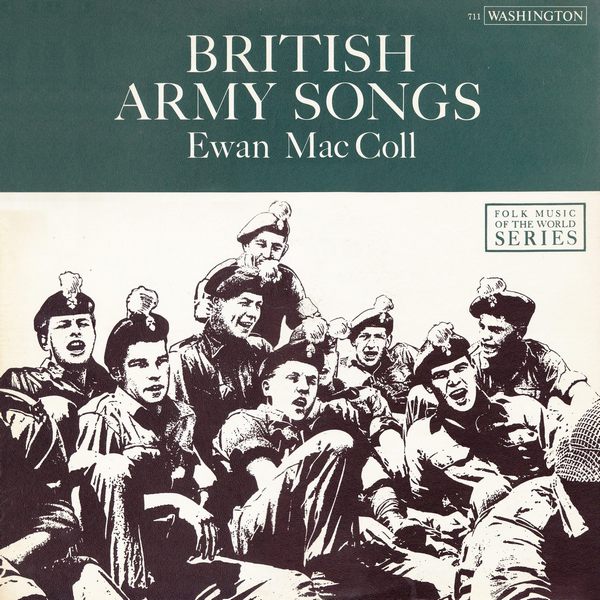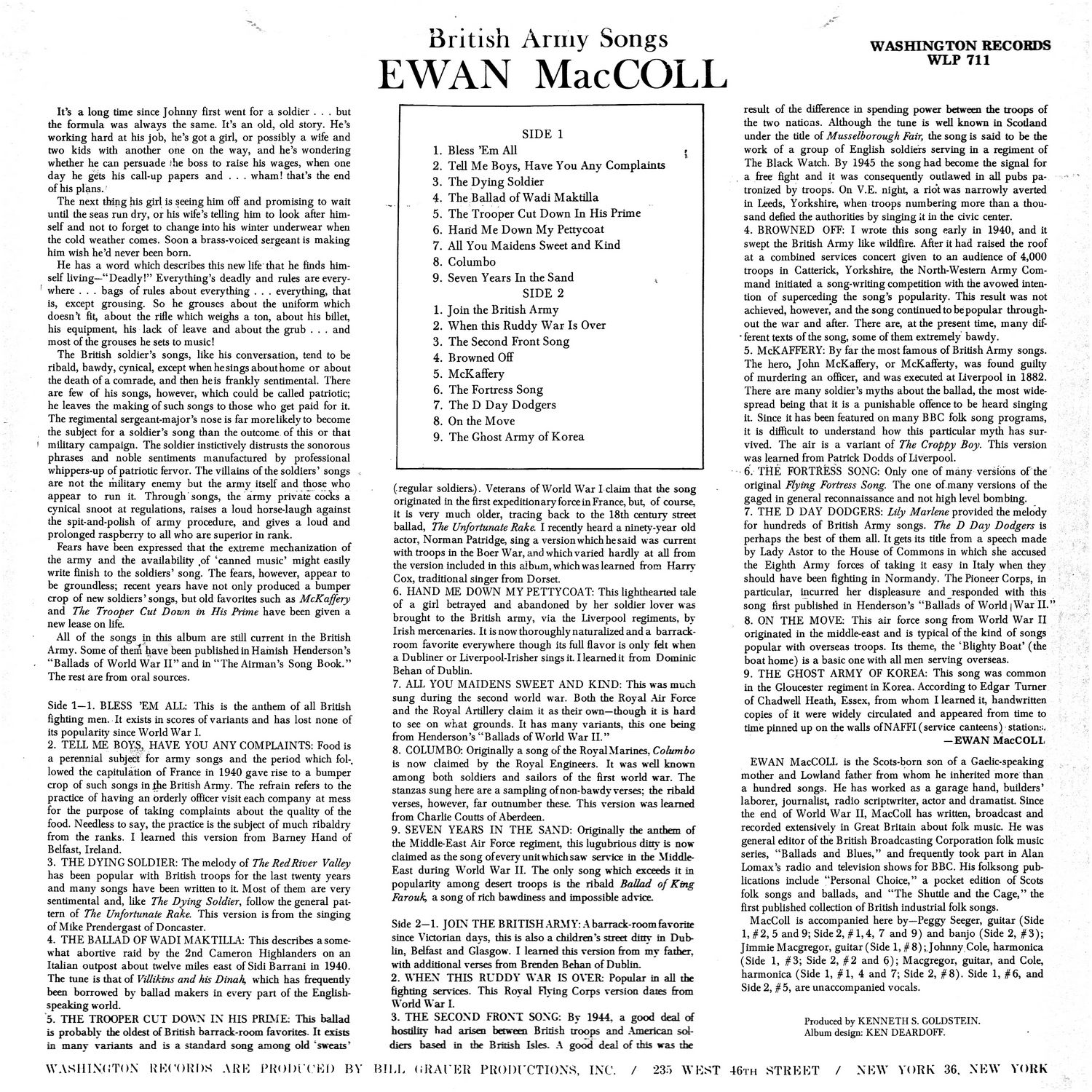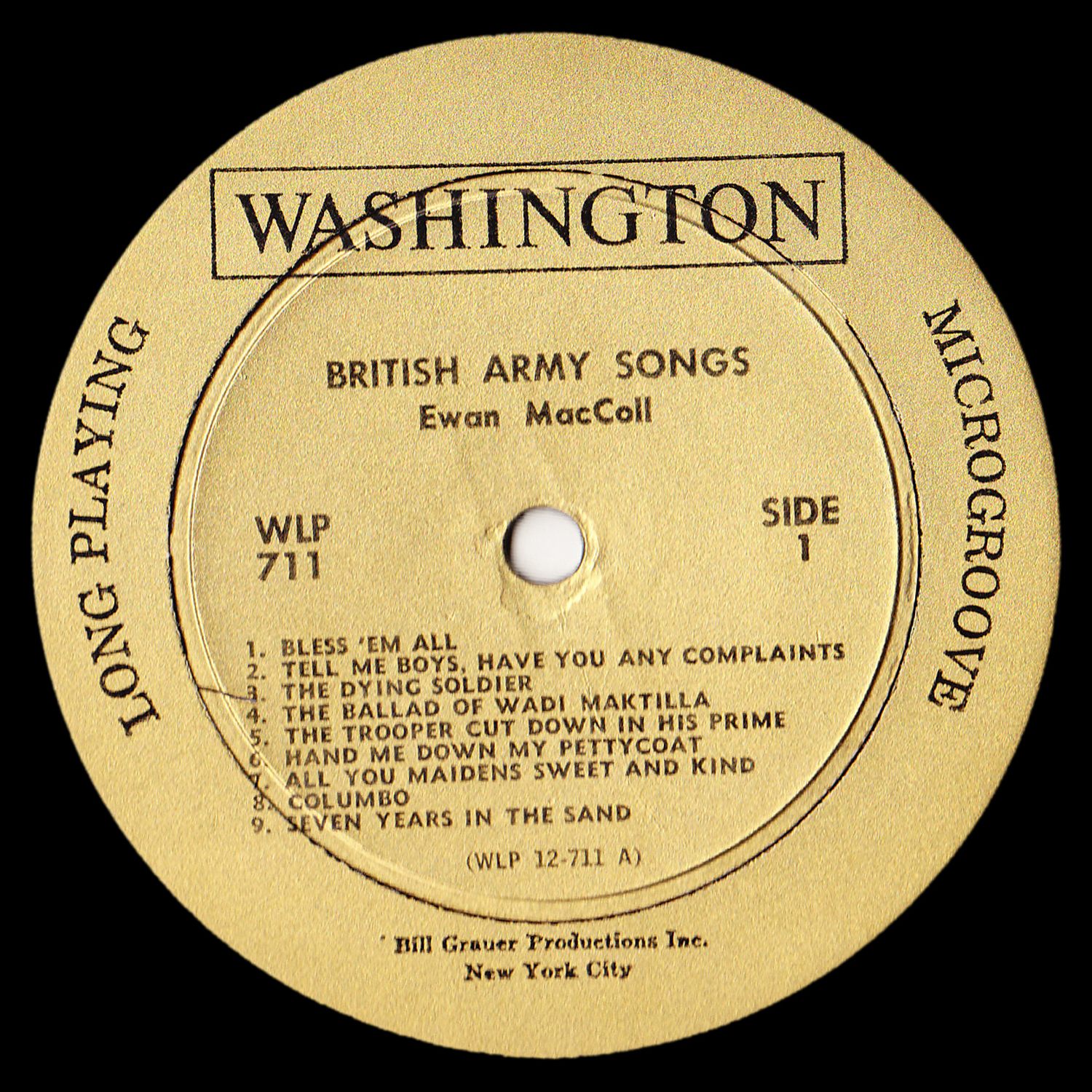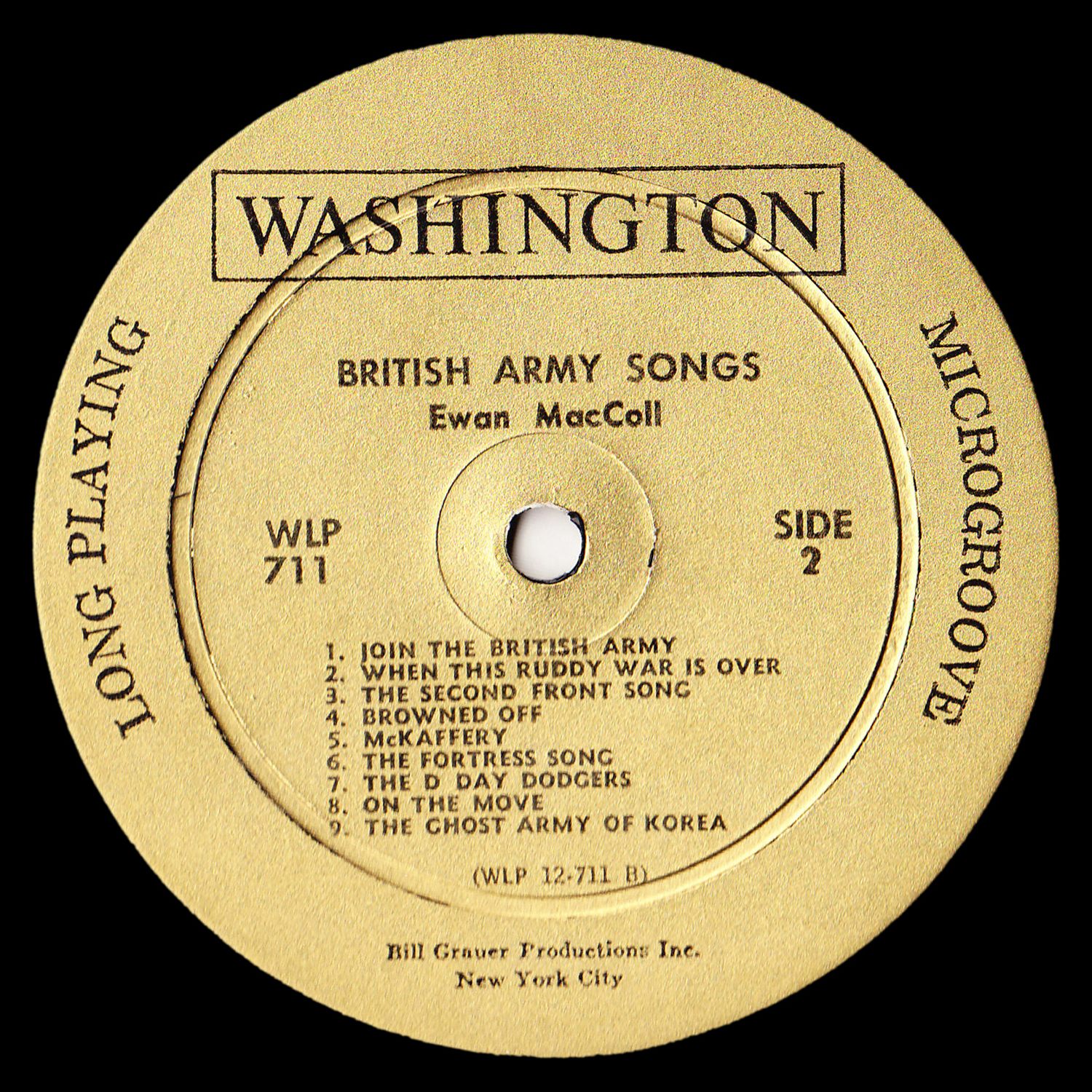

 |


 |
Sleeve Notes
It's a long time since Johnny first went for a soldier … but the formula was always the same. It's an old, old story. He's working hard at his job, he's got a girl, or possibly a wife and two kids with another one on the way, and he's wondering whether he can persuade the boss to raise his wages, when one day he gets his call-up papers and … wham! that's the end of his plans.
The next thing his girl is seeing him off and promising to wait until the seas run dry, or his wife's telling him to look after himself and not to forget to change into his winter underwear when the cold weather comes. Soon a brass-voiced sergeant is making him wish he'd never been born.
He has a word which describes this new life that he finds himself living — "Deadly!" Everything's deadly and rules are everywhere … bags of rules about everything … everything, that is, except grousing. So, he grouses about the uniform which doesn't fit, about the rifle which weighs a ton, about his billet, his equipment, his lack of leave and about the grub … and most of the grouses he sets to music!
The British soldier's songs, like his conversation, tend to be ribald, bawdy, cynical, except when he sings about home or about the death of a comrade, and then he is frankly sentimental. There are few of his songs, however, which could be called patriotic; he leaves the making of such songs to those who get paid for it. The regimental sergeant-major's nose is far more likely to become the subject for a soldier's song than the outcome of this or that military campaign. The soldier instinctively distrusts the sonorous phrases and noble sentiments manufactured by professional whippers-up of patriotic fervor. The villains of the soldiers' songs are not the military enemy but the army itself and those who appear to run it Through songs, the army private cocks a cynical snoot at regulations, raises a loud horse-laugh against the spit-and-polish of army procedure, and gives a loud and prolonged raspberry to all who are superior in rank.
Fears have been expressed that the extreme mechanization of the army and the availability of 'canned music' might easily write finish to the soldiers' song. The fears, however, appear to be groundless; recent years have not only produced a bumper crop of new soldiers ' songs, but old favorites such as McKaffery and The Trooper Cut Down in His Prime have been given a new lease on life.
All of the songs in this album are still current in the British Army. Some of them have been published in Hamish Henderson's "Ballads of World War II" and in "The Airman's Song Book." The rest are from oral sources.
BLESS 'EM ALL: This is the anthem of all British fighting men. It exists in scores of variants and has lost none of its popularity since World War I.
TELL ME BOYS, HAVE YOU ANY COMPLAINTS: Food is a perennial subject for army songs and the period which followed the capitulation of France in 1940 gave rise to a bumper crop of such songs in the British Army. The refrain refers to the practice of having an orderly officer visit each company at mess for the purpose of taking complaints about the quality of the food. Needless to say, the practice is the subject of much ribaldry from the ranks. I learned this version from Barney Hand of Belfast, Ireland.
THE DYING SOLDIER: The melody of The Red River Valley has been popular with British troops for the last twenty years and many songs have been written to it. Most of them are very sentimental and, like The Dying Soldier, follow the general pattern of The Unfortunate Rake. This version is from the singing of Mike Prendergast of Doncaster.
THE BALLAD OF WADI MAKTILLA: This describes a somewhat abortive raid by the 2nd Cameron Highlanders on an Italian outpost about twelve miles east of Sidi Barrani in 1940. The tune is that of Villikins and his Dinah, which has frequently been borrowed by ballad makers in every part of the English-speaking world.
THE TROOPER CUT DOWN IN HIS PRIME: This ballad is probably the oldest of British barrack-room favorites. It exists in many variants and is a standard song among old 'sweats' (regular soldiers). Veterans of World War I claim that the song originated in the first expeditionary force in France, but, of course, it is very much older, tracing back to the 18th century street ballad, The Unfortunate Rake. I recently heard a ninety-year old actor, Norman Patridge, sing a version which he said was current with troops in the Boer War, and which varied hardly at all from the version included in this album, which was learned from Harry Cox, traditional singer from Dorset.
HAND ME DOWN MY PETTYCOAT: This lighthearted tale of a girl betrayed and abandoned by her soldier lover was brought to the British army, via the Liverpool regiments, by Irish mercenaries. It is now thoroughly naturalized, and a barrack-room favorite everywhere though its full flavor is only felt when a Dubliner or Liverpool-Irisher sings it. I learned it from Dominic Behan of Dublin.
ALL YOU MAIDENS SWEET AND KIND: This was much sung during the second world war. Both the Royal Air Force and the Royal Artillery claim it as their own — though it is hard to see on what grounds. It has many variants, this one being from Henderson's "Ballads of World War H."
COLUMBO: Originally a song of the Royal Marines, Columbo is now claimed by the Royal Engineers. It was well known among both soldiers and sailors of the first world war. The stanzas sung here are a sampling of non-bawdy verses; the ribald verses, however, far outnumber these. This version was learned from Charlie Coutts of Aberdeen.
SEVEN YEARS IN THE SAND: Originally the anthem of the Middle East Air Force regiment, this lugubrious ditty is now claimed as the song of every unit which saw service in the Middle East during World War II. The only song which exceeds it in popularity among desert troops is the ribald Ballad of King Farouk, a song of rich bawdiness and impossible advice.
JOIN THE BRITISH ARMY: A barrack-room favorite since Victorian days, this is also a children's street ditty in Dublin, Belfast and Glasgow. I learned this version from my father, with additional verses from Brenden Behan of Dublin.
WHEN THIS RUDDY WAR IS OVER: Popular in all the fighting services. This Royal Flying Corps version dates from World War L
THE SECOND FRONT SONG: By 1944, a good deal of hostility had arisen between British troops and American soldiers based in the British Isles. A good deal of this was the result of the difference in spending power between the troops of the two nations. Although the tune is well known in Scotland under the title of Musselborough Fair, the song is said to be the work of a group of English soldiers serving in a regiment of The Black Watch. By 1945 the song had become the signal for a free fight, and it was consequently outlawed in all pubs patronized by troops. On V.E. night, a riot was narrowly averted in Leeds, Yorkshire, when troops numbering more than a thousand defied the authorities by singing it in the civic center.
BROWNED OFF: I wrote this song early in 1940, and it swept the British Army like wildfire. After it had raised the roof at a combined services concert given to an audience of 4,000 troops in Catterick, Yorkshire, the North-Western Army Command initiated a song-writing competition with the avowed intention of superseding the song's popularity. This result was not achieved, however, and the song continued to be popular throughout the war and after. There are, at the present time, many different texts of the song, some of them extremely bawdy.
McKAFFERY: By far the most famous of British Army songs. The hero, John McKaffery, or McKafferty, was found guilty of murdering an officer, and was executed at Liverpool in 1882. There are many soldier's myths about the ballad, the most widespread being that it is a punishable offence to be heard singing it. Since it has been featured on many BBC folk song programs, it is difficult to understand how this particular myth has survived. The air is a variant of The Croppy Boy. This version was learned from Patrick Dodds of Liverpool.
THE FORTRESS SONG: Only one of many versions of the original Flying Fortress Song. The one of many versions of the gaged in general reconnaissance and not high-level bombing.
THE D DAY DODGERS: Lily Marlene provided the melody for hundreds of British Army songs. The D Day Dodgers is perhaps the best of them all. It gets its title from a speech made by Lady Astor to the House of Commons in which she accused the Eighth Army forces of taking it easy in Italy when they should have been fighting in Normandy. The Pioneer Corps, in particular, incurred her displeasure and responded with this song first published in Henderson's "Ballads of World War II."
ON THE MOVE: This air force song from World War II originated in the middle east and is typical of the kind of songs popular with overseas troops. Its theme, the 'Blighty Boat' (the boat home) is a basic one with all men serving overseas.
THE GHOST ARMY OF KOREA: This song was common in the Gloucester regiment in Korea. According to Edgar Turner of Chadwell Heath, Essex, from whom I learned it, handwritten copies of it were widely circulated and appeared from time to time pinned up on the walls of NAFFI (service canteens) stations
— EWAN MacCOLL
EWAN MacCOLL is the Scots-born son of a Gaelic-speaking mother and Lowland father from whom he inherited more than a hundred songs. He has worked as a garage hand, builders' laborer, journalist, radio scriptwriter, actor and dramatist. Since the end of World War II, MacColl has written, broadcast and recorded extensively in Great Britain about folk music. He was general editor of the British Broadcasting Corporation folk music series, "Ballads and Blues," and frequently took part in Alan Lomax's radio and television shows for BBC. His folksong publications include "Personal Choice," a pocket edition of Scots folk songs and ballads, and "The Shuttle and the Cage," the first published collection of British industrial folk songs.